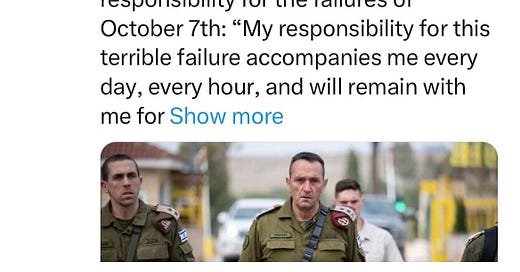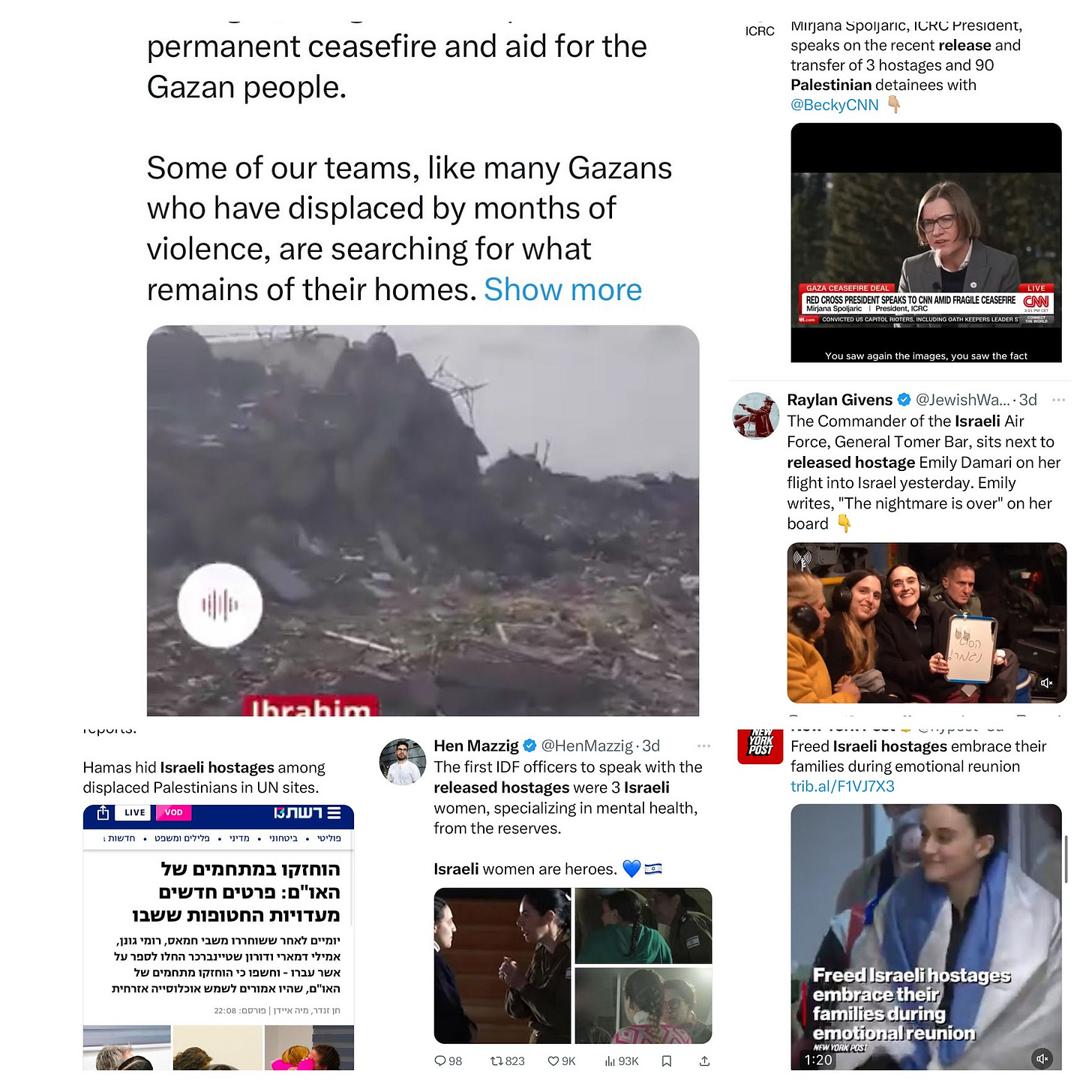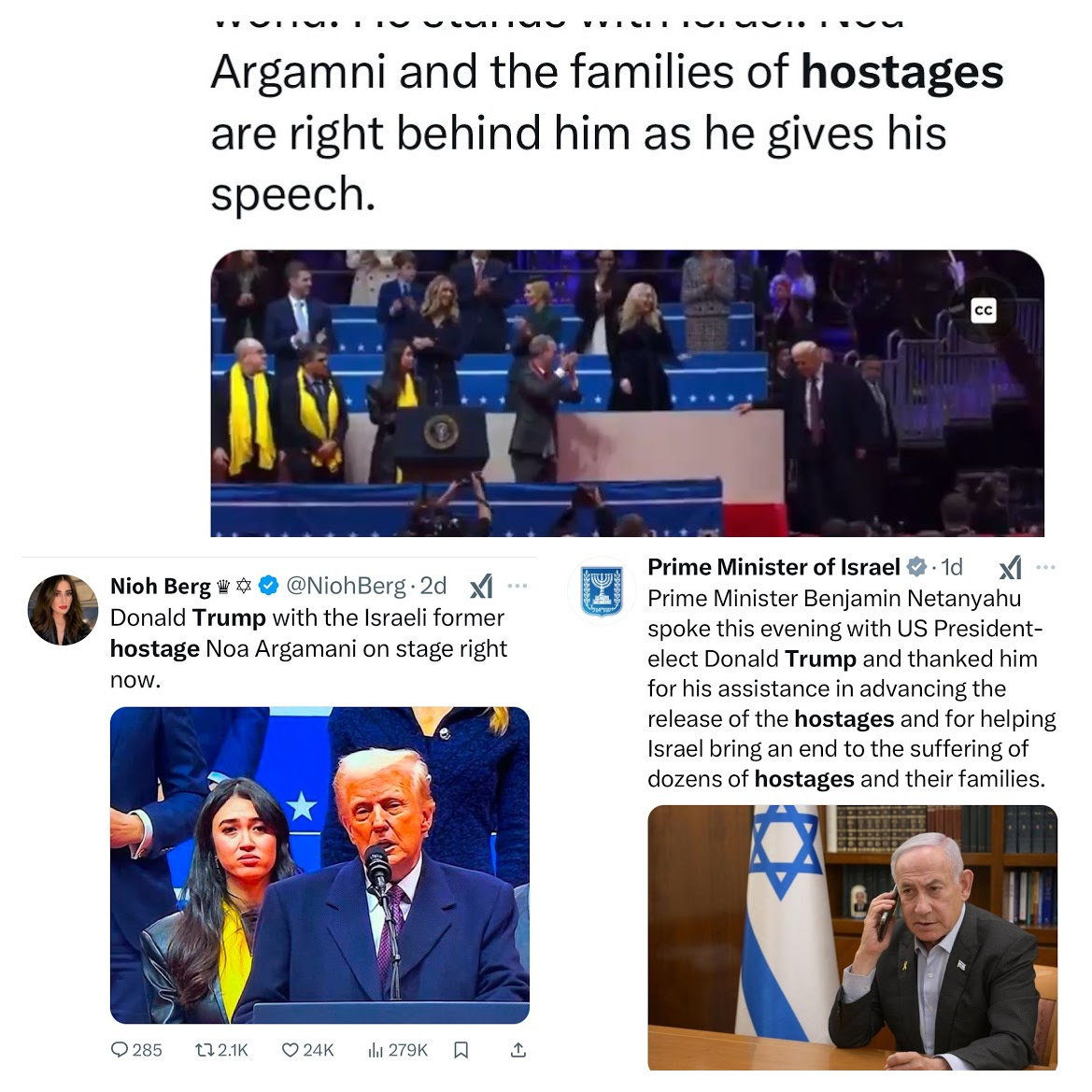Israel at War - Day 476
1. IDF Chief Of Staff Resigns
Major General, Hertzi Halevi, announced his resignation in a letter to Defense Minister Israel Katz, and PM Netanyahu. He later spoke publicly. In his letter, Halevi explained that he takes full responsibility for the neglect of October 7th, which enabled Hamas militants to massacre more than 1,200 Israelis, almost 900 of them civilians, and kidnap 251 people from the army bases and the small communities on the border with Gaza. This is the most horrific event in the history of the State of Israel. Halevi already said on October 8th, that he sees himself responsible for the events, and said then that he will resign. He explained now that his resignation will be in effect on March 6th, right after the end of the first phase of the hostages deal. He explained that he thought it was important that he lead the army after October 7th, to regain Israeli superiority and deterrence, and reach a hostage deal. Now that all this was achieved he can resign. He added that the event will continue to torment his conscience for the rest of his life and that he is convinced that only a full state investigative committee will be able to find out who was responsible for the events. His resignation falls into the ongoing debate as to who was responsible for the neglect. So far none of the politicians in office have taken any responsibility, but many military officers have already resigned. Right now the government and PM Netanyahu not only refuse to take any responsibility, but there are many conspiracy theories alleging that the army intentionally prevented the people in office from receiving the full picture of Hamas’ plans for October 7. Halevi addresses those accusations in his speech to the public, denying all such allegations. PM Netanyahu and the members of the coalition also refuse to establish a state investigative committee, and insist on a vague definition of the “people’s committee”, a euphemism for a committee that will absolve them of all responsibility. His resignation opens a race for his replacement. Halevi himself suffered many smears and attacks at the government meetings in which he was present.
2. Three Female Hostages Released on First Day of Ceasefire
The ceasefire between Israel and Hamas took effect on Sunday, January 19th, after 471 days of war in Gaza. Late in the afternoon, three Israeli female hostages, Romi Gonen, Emily Damari, and Doron Steinbrecher were released from Hamas captivity and reunited with their families in Israel. Ninety Palestinian prisoners and detainees, including 62 women and 8 minors, were released from Israeli prisons and reunited with their families in East Jerusalem and the West Bank. None of the detainees released was convicted for the murder of Israelis.
The exchange of hostages and prisoners did not run completely smoothly. Hamas failed to submit the list of hostages to be released in the first phase of the ceasefire deal by the 8:30 A.M. deadline, and the IDF attacked Hamas targets in response. IDF spokesman Hagari said in a press briefing that Israel "will not tolerate any deviations from the agreements."
The atmosphere on the day of the release of the first three hostages was marked by tense anticipation. Thousands gathered at the Hostages’ Square in Tel Aviv to watch live broadcasts from all major news outlets as the hostages were handed over by Hamas armed operatives to the Red Cross, and later delivered to IDF soldiers. Millions of Israelis were glued to their screens watching the hostages reunited with their families at a special compound in a hospital in central Israel. Following an initial examination, Israeli health officials said that the three women were in "good condition" considering that they had spent fifteen months in captivity. One of the hostages lost two fingers from Hamas gunfire on October 7th, 2023.
The parents of the released hostages met with PM Netanyahu and told him that their daughters are urging him not to stop until all the hostages are free. This, as the media reports efforts by far-right minister Smotrich to sabotage the continuation of the ceasefire/hostage agreement.
3. Situation in West Bank Continues to be Highly Volatile
Yet another escalation in violence in the West Bank occurred this week. On the day of the release of Palestinian prisoners, as part of the first round of the ceasefire agreement, dozens of Jewish far-right settlers torched houses and vehicles in several Palestinian communities, where Palestinian prisoners were expected to return. Two of the Jewish rioters were shot and severely wounded by an Israeli police officer after allegedly attacking the officer. The Minister of Defense, who cancelled all the administrative detention orders against Jewish rioters in the West Bank, said in response to the recent riots that he strongly condemns any form of violence against Palestinians and that the perpetrators will be prosecuted in court.
The IDF and Shin Bet (Central Security Service) launched a “counter terror” attack in the Jenin refugee camp, including airstrikes as well as armed ground forces incursions. According to Palestinian sources, at least thirteen people were killed and 35 injured. Among them was a 14-year-old boy who was in the street near his home. IDF and Shin Bet (Central Security Service) officials said that the operation will continue "as long as necessary." Following a government decision, the IDF blocked the main roads connecting Palestinian communities. The roads will remain blocked until the end of the first phase of the ceasefire, in five weeks.
Far-right Finance Minister Bezalel Smotrich, chair of the Religious Zionism party, who voted against the ceasefire/hostage agreement, said that the operation was a result of the government’s approval of his party’s request that military operations in the West Bank will be part of the war effort. He added that the operations are designed to enhance the security of Jewish settlers and settlements. In response to the military operation in the West Bank, Hamas called on Palestinian residents to step up their resistance to the Israeli military forces.
4. Likud Minister Appointed to Take Over Jewish Power Portfolios.
The far-right Jewish Power party withdrew from the government coalition, and its three ministers resigned following their objection to the ceasefire/hostage deal, which they labeled as “a victory to terrorism”. As a result, the cabinet approved the appointment of Minister of Tourism Haim Katz (Likkud) as interim minister for a period of three months for the three portfolios previously held by Jewish Power, including the Ministry of National Security.
Eight ministers voted against the ceasefire/hostage deal last Friday, including Minister of Diaspora Affairs Amichai Chikli, who threatened to resign over the implementation of the first phase of the ceasefire/hostage deal.
Katz, a longtime Likud member, was indicted and found guilty in a plea bargain for sponsoring a bill for corporate bond repayment that benefited a close friend who served as his financial advisor. He was suspended for six months and paid a fine of $23,400.
Political analysts commented that Katz’s appointment is designed to allow PM Netanyahu to maintain control over the ministries held by Jewish Power. Opposition Chair Yair Lapid (Yesh Atid) criticized the government's decision to appoint Katz as interim minister of three additional portfolios, claiming that even the most competent minister cannot oversee four government ministries.
5. President Trump in a Public Gesture of Support for the Families of Israeli Hostages
In his first public appearance after the Inauguration, President Trump displayed a meaningful gesture of support towards a group of Israelis who were in the crowd, who were wearing yellow scarfs, and carrying photos of hostages held by Hamas in Gaza, some of which were in captivity and released. President Trump proudly stated again, that only thanks to his pressure, was the deal finalized to release 33 hostages in the first phase and the rest to be released in the second and third phases. He then calledon the families and the hostages to join him on stage where they remained for the duration of his speech. In his inaugural speech, President Trump said he wants to be a peacemaker and stop all wars. But he later added that he is not sure that all the phases of the deal will be concluded.
Right-wing supporters and political figures, including members of PM Netanyahu’s government, are looking forward to President Trumps policies. They assume that Israel will be allowed to be more liberal in terms of annexation of parts of the West Bank, allow more Israeli settlements to be built in the territories, and that President Trump will not put pressure on Israel in terms of compromises with the Palestinians. Israel also assumes that President Trump will be more supportive towards the need to continue the war against Hamas in Gaza and the West Bank, and against Hizbollah in Lebanon. Meanwhile, among his first executive orders, President Trump also signed an executive order that lifted the economic sanctions that were imposed on Israeli settlers that violated the law by intimidating and allegedly attacking Palestinians.










